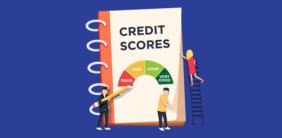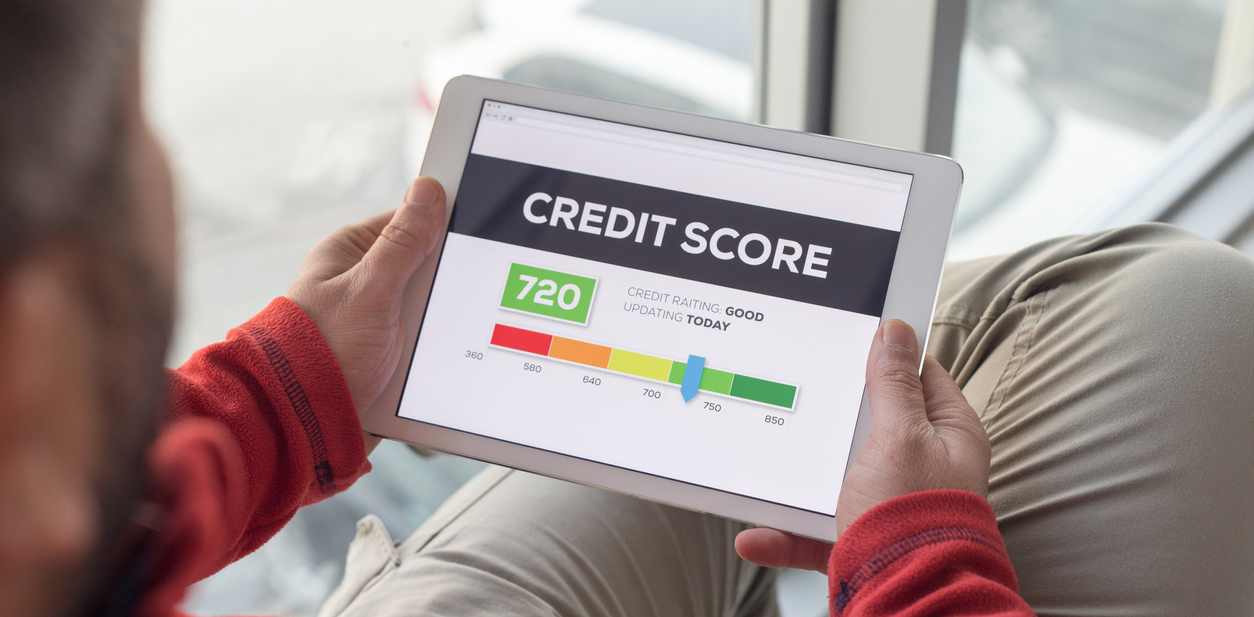Think of your credit report as a physical for your financial health — except it’s free.
When you see your doctor for your annual physical, you’re told what you’re doing right and what needs improvement. The results of your physical give you insight into your overall health so you can go into the next year with a better understanding of how to take care of yourself.
Checking your credit report is a lot like undergoing your annual physical. The information contained on your credit report determines whether or not you’re likely to qualify for a car loan, take out a mortgage, or finance that sweet new toy you’ve had your eyes on. Your credit report can also tell you if you’ve been the victim of identity theft.
Though you may try to avoid your annual physical, you shouldn’t ignore your annual credit report — especially considering it’s free.
What is a Credit Report?
A credit report is a snapshot of your credit history. Your credit reports show a breakdown of your credit activity, debt, and payment history as reported by creditors, lenders, and other entities that you’ve established loans, debt, and balances with.
The information on a credit report gives you or a possible creditor an idea of how you manage your credit and debt. Your credit report can be used to glean how much debt you have, how you pay your bills and loans, and whether you should be approved or denied for more credit. Creditors will also use your report to determine interest rates for any loan or account that you’re applying for.
Reviewing your own credit report gives you the opportunity to check for and dispute any inaccuracies and errors. As a result, you can correct your report to potentially improve the likelihood you’ll be approved for that new car loan or mortgage you’ve been working toward.
Where the data on your credit report comes from
When you take out a loan or ask for credit, the lender may report that information to any or all of the major credit bureaus. Though there are several credit bureaus, the three big players in the industry are Equifax, Experian, and TransUnion.
Lenders aren’t required to report your information to every bureau. As such, your credit report may not always be identical from bureau to bureau (but should be relatively similar).
For example, if you refinance your car loan, the lender may report the new loan to Equifax, Experian, and TransUnion — or any combination of the three.
Credit report: a breakdown of your credit activity, debt, and payment history as reported by creditors, lenders, and other entities to the credit bureaus.
Credit score: a three-digit score used by financial institutions to make credit decisions. The most commonly used credit score is the FICO score.
Credit bureaus: data collection agencies (e.g. Equifax, Experian, and TransUnion) that keep records of individuals’ credit information.
Your Rights Under the Fair Credit Reporting Act (FCRA)
The Fair Credit Reporting Act, or FCRA, is a federal law that regulates how credit bureaus, agencies, and specialists collect, treat, and share your credit information. The FCRA instituted rules that require the “accuracy, fairness, and privacy” of the information collected from consumers and specifies how your credit information is collected, used, and shared.
The FCRA grants you the right to:
- Be told if information in your credit file is held against you to deny a credit or employment application, loan, insurance policy, or other adverse action, and to provide you the details of the agency responsible for providing such information;
- Receive a free copy of your credit report from consumer reporting agencies in a number of situations, such as an adverse action taken against you because of the information found on your credit report;
- Ask for a credit score;
- Dispute false, inaccurate, unverified, or incomplete information found in your credit report, and requires any such information be fixed or removed by the consumer reporting agency within 30 days;
- Not have negative information older than seven years, or bankruptcies older than 10 years, reported on your credit report;
- Limit access to your credit report to only those you give consent to, such as a creditor, lender, employer, or landlord;
- Request a security freeze that prohibits a consumer reporting agency from releasing information on your credit report to anyone without your express permission.
Most importantly, the FCRA also requires each of the three major credit bureaus to provide you with an annual free credit report upon request.
How to Check Your Credit Report for Free
Accessing your credit report can be done through a variety of means. You’re entitled to your free credit report once per year from each of the three major credit bureaus. You’re also able to receive a free credit report in certain situations, such as being a victim of fraud or receiving an adverse action notice.
Additional credit reports can be purchased at any time for a maximum cost of $12.50 per report.
Accessing your annual free credit report
The official website to check your yearly free credit report is the aptly-named AnnualCreditReport.com. AnnualCreditReport.com is sponsored by Equifax, Experian, and TransUnion and provides accurate, up-to-date reports from each of the three bureaus.
AnnualCreditReport.com doesn’t require your credit card information to access your credit report — the process is entirely free, though additional paid options may be offered. You will, however, be required to provide some personal information, such as your name, address, and Social Security number, to verify your identity.
Checking your credit report more frequently
Some online websites and services provide you free access to your credit report by pulling information from participating credit bureaus.
Websites that offer free credit reports don’t always provide access to reports from all three major credit bureaus, however. In some cases, you may only be offered access to the report generated by one or two bureaus. You may also be provided your VantageScore, a type of credit scoring that differs slightly from your FICO score.
Free credit report websites aren’t credit bureaus and don’t collect any of the data compiled into your credit report from your specific creditors, lenders, and other sources. This means that your credit report may be relatively accurate, but may not be as complete or up-to-date as a report provided by a credit bureau.
Popular websites for checking your credit for free
- Intuit Credit Karma: Intuit Credit Karma generates weekly credit reports and VantageScores from Equifax and TransUnion, then uses that data to provide you personalized recommendations and offers to help you manage your finances. Free credit monitoring alerts you to changes made to your credit report so you can stay on top of potentially fraudulent activity.
- Credit Sesame: Credit Sesame pulls a monthly credit report from TransUnion, then provides a personalized strategy and set of offers to help you manage your credit and debt. Credit Sesame also provides free credit monitoring and access to your VantageScore.
- Credit.com: Credit.com provides an Experian-generated credit report and VantageScore every 14 days. Your data will then be analyzed to create a credit report card and personalized recommendations for managing your credit and improving your score.
Your credit card company may also provide free credit reports as a perk or benefit. Some services, such as CreditWise from Capital One, don’t even require you to hold a card with the company offering the service, and function in much the same way as other credit report websites.
Specialty credit reporting companies
Credit bureaus aren’t the only entities that compile credit reports. Specialty credit reporting companies, such as those that screen tenants, track insurance claims, and record banking history, create credit files for the purposes of providing that information to specific services and businesses, like landlords, insurance companies, and even banks.
You’re entitled to obtain free credit reports from any specialty credit reporting company. These reports can give you an idea as to whether or not you’re likely to qualify for or be approved for a specific type of credit or account, and should be analyzed in much the same way as your regular credit report.
For example, information about a bad check you’ve written won’t be reported on your credit report. Instead, that data will be collected by a company that specializes in gathering information about consumers’ checking accounts. If you try to open a bank account at a new bank, the new bank may request your check-writing history from a checking account collection company to determine how often you write bad checks or overdraft your account.
Where Can I Get My FICO Credit Score?
Your FICO score is a rating that helps lenders determine how likely you are to repay your loans. FICO scores are used by over 90 percent of lenders to calculate the total credit extended to you, the interest rate on that credit, and how long you have to repay the debt.
Though the information found on your credit report plays a major role in determining your FICO credit score, you’ll be hard-pressed to find it on your report — it’s not there.
Access to your FICO score can be purchased from authorized retailers. Many banks, credit card companies, and other lenders also offer free access to your FICO score as a perk or benefit. Applying for a mortgage loan may also result in you receiving information about your FICO score.
FICO scores are used by over 90 percent of lenders to calculate the total credit extended to you, the interest rate on that credit, and how long you have to repay the debt.
Should I Ever Pay for My Credit Report or Score?
Because of how easy it is to access your free credit report, situations in which you should pay for access are limited. Be sure you’ve exhausted all free options before forking over your hard-earned cash.
Before buying access to your FICO credit score, consult your banking or credit card documentation to see if free access to your credit score is included in the institution’s perks and benefits. If not, consider purchasing your credit score information before applying for a major loan or line of credit to see where you stand.
Should I Sign up for Credit Monitoring?
Credit monitoring is a service that checks to see if you and your information have fallen victim to identity theft or fraud. Many financial institutions — especially recent victims of data breaches or leaks — offer credit monitoring services for free. Signing up for such services can keep you in the loop and help protect your information from being misused by the unscrupulous. You may also be offered some form of identity theft insurance or protection.
Free credit monitoring is often provided by websites, like Intuit Credit Karma, Credit Sesame, and Credit.com, services such as Capital One’s CreditWise, or as a perk or benefit of using certain credit cards.
Paid credit monitoring services are also offered and should be considered if you have been or are highly likely to be the victim of identity theft. The best credit monitoring packages provide coverage for all three credit bureaus and will alert you to changes to your credit and, sometimes, provide protection and insurance against identity theft and fraud.
Why Should I Check My Credit Report?
Your credit report is a tool that can help you maintain and fix your credit standing. Whether you’re applying for a large loan in the near future or seeking only to get a handle on your finances, consulting your credit report can give you the information you need to make smart decisions and move in the right direction.
There are three major reasons you should check your credit report.
1. Get a sense of your overall creditworthiness and discover areas you can improve
Lenders look at the same report you’re given access to when you request a free copy. The information on your report is what they’ll base their decision on when it comes time to accept or deny your loan application.
If you have a healthy credit report with few to no negative credit factors, chances are high that your application will be approved by a lender. On the other hand, lack of credit history, repeated late or missed payments, overdue debt, and delinquencies may very well result in a rejected credit application — or unfavorable terms and high interest rates.
2. Identify and fix any inaccuracies or incorrect or outdated information
Your credit report is your credit report. Information reported on your credit report should be related entirely to you and your credit history, but that’s not always the case. False and inaccurate data can lead to you being denied credit when you should have otherwise been approved.
If you find any inaccuracies on your report, file a dispute with the appropriate credit bureau. Under the FCRA, credit bureaus must verify, fix, or remove inaccurate information within 30 days.
3. To discover if your personal information has been compromised by identity theft
Criminals can steal your identity and use it to wreak havoc on your credit, causing you to be denied credit or forced to pay higher interest rates with harsher terms.
Checking your credit report can clue you into potential identity theft, giving you the chance to nip it in the bud before your credit is destroyed. When looking for fraud and theft, pay attention to any accounts, credit cards, or sources of debt you don’t remember opening or being involved in.
What Should I Look for in My Free Annual Credit Report?
At first glance, your credit report may appear a bit overwhelming. After all, there are a lot of numbers, and you may not immediately recognize their significance or relevance.
Personally identifiable information (PII)
Your personal information is considered “personally identifiable information” and is comprised of data including your:
- Name and any aliases
- Birthday
- Current and past addresses
- Social Security number
- Phone number
- Employment information
PII tells lenders that you are who you say you are and states that the information on your credit report is yours. If your PII isn’t correct, the rest of your credit report may not be either. Incorrect PII may also signify that you’ve been the victim of identity theft.
Accounts
After looking through and confirming your PII is accurate, you’ll see a list of auto loans, credit cards, personal and student loans, mortgages, and other accounts. Some may be open, or active, while others may be closed (either by request or because you’ve paid it off in full).
You will also be presented with the type of account, the remaining balance (if any), open and close date, monthly payment, when you’ve made a late payment, and any remarks made on the account.
Inquiries
Inquiries, or credit checks, tell you who has recently accessed your credit report. They are typically performed when you apply for a loan or credit or open a new account somewhere.
There are two types of credit inquiries, but only one will be shown on your credit report. Soft inquiries are “soft pulls” and happen when an entity, including yourself, looks at your credit report for a purpose unrelated to opening a new account. They may occur as a result of an employment application or when a company is pre-approving you before sending you a credit offer.
Hard inquiries, on the other hand, are shown on your credit report. They represent situations in which you (or someone else) has applied to get credit. They can cause a negative impact to your overall credit score, but are often grouped together and counted as one when it’s apparent you’re applying for credit for a singular purpose, such as a refinance auto loan.
Collections
Having an account sent to collections is a negative credit factor. A history of accounts in collections alerts would-be lenders to the possibility that you’ve defaulted or been delinquent on past loans and can contribute to you being rejected for a new line of credit.
Unrecognized accounts in collections can be indicative of identity theft. Since criminals have no intent to pay your bills (or else we’d almost welcome them to steal our identities), a fraudulent account is likely to enter collections.
Public records
Bankruptcies, liens, foreclosures, and legal judgments are all considered public records and are subsequently listed on your credit report. Public records negatively impact your creditworthiness.
Pay close attention to any public records listed on your credit report. Dispute those that are inaccurate, false, or misreported. Some legitimate public records may be able to be removed from your report as a result of you satisfying the account balance, such as a tax lien made against you by the IRS or your state’s tax department.
Bear in mind, too, that only public records related to debt are listed on your credit report. Public records such as criminal convictions, marriages, and divorces won’t be found on a credit report.
Further reading on credit
How Often Should I Check My Free Credit Report?
Because your free credit report is available annually from each of the three major credit bureaus, you should check it at least once per year. An annual check-up will clue you into any potential identity theft, fraud, or errors that need your attention prior to fixing.
You don’t need to order all three credit reports at once either. It’s a good idea to request a free credit report from a single credit bureau once every four months. For example, you may want to request your free Equifax report in January, your free Experian report in May, and your free TransUnion report in September. Doing so will allow you to track your creditworthiness throughout the year and give you ample opportunity to fix any errors as they crop up.
Other times to check your credit report include:
- Before applying for a major loan or line of credit, such as a mortgage or car loan
- Looking for a new job
- Suspicion of identity theft
- Receiving a notice of adverse action after applying for credit
Is It Illegal to Check Someone Else’s Credit Report?
Credit reports aren’t as private as you’d assume. Though the FCRA limits who can access another person’s credit report, a large group of organizations are permitted access to your information.
What matters most is that the requesting party needs to demonstrate a valid purpose to access your report. If, for an example, you apply for a car loan, the lender has a valid purpose to look at your credit report. However, a spat with a vindictive neighbor who wants to use your information against you wouldn’t be considered a valid purpose to request your report.
Typically, your credit report will be requested by creditors, insurers, employers, landlords, and government authorities. If you have an open account with an entity, or are seeking to open an account or request a loan from one, it’s reasonable to assume that they’ll request a copy of your credit report. In some cases, such as employment applications, you must give your consent before an entity can request your report.
Credit reporting companies may also send your credit report to entities in response to a subpoena or as a result of your written request.
Can I check my child’s credit report?
Credit reports start to be compiled when an individual establishes credit. In some cases, your minor child may have credit and, subsequently, a credit report. Listing your child as an authorized user or joint account holder is sufficient cause for a credit file to open in their name. Similarly, a credit report will be started for your child if a loan is in their name.
The worst-case scenario, of course, is that your child is the victim of identity theft and ends up with a credit report rife with negative information. Can you check your child’s credit report to track their creditworthiness and protect them against fraud?
Fortunately, the answer is yes, but the process is a bit more involved compared to checking your own credit report.
Each of the three major credit bureaus allows parents or guardians to request access to their child’s credit report upon receiving documentation as to your identity and that of your child.
Once you receive your child’s credit report (if it exists), treat it the same way as you would your own — and maybe even use it as a teaching moment to introduce your child to the concept of building credit and safe spending habits!
Take Advantage of Your Free Annual Credit Report
There are no excuses for not checking your annual credit report for free, much as it’s hard to win an argument with your doctor when you skip your annual physical. Staying informed and up-to-date about the health of your credit helps you nip issues in the bud — before they have a chance to avalanche into something worse.
Check your free credit report at least once per year. You’ll be glad you did when it comes time to buy your dream car or head out on that sweet Caribbean vacation.
;)












